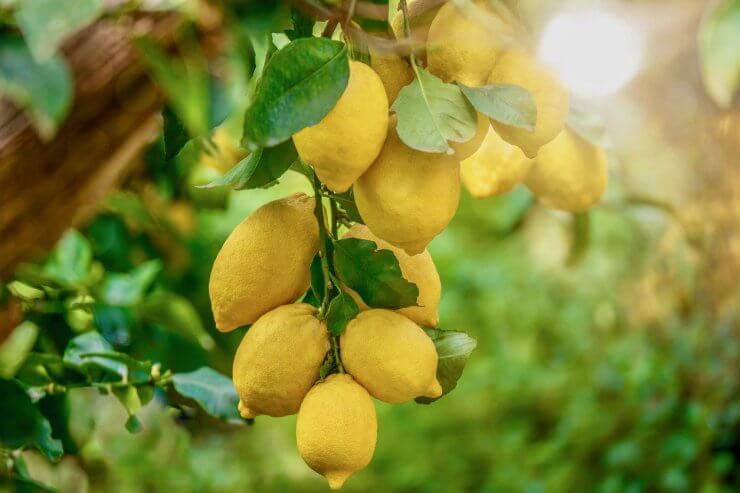When I think of a refreshing summer drink, lemonade is one of the first things that comes to mind. If sunshine was a fruit, I’m pretty sure it would be a lemon. But there’s so much more to this little powerhouse than lemonade. It’s popular in many savory and sweet dishes, you’ll find it in any number of furniture polishes, you can clean copper pots with it, and it has more than a few medicinal uses. You’ll even find the lemon tree incorporated into the symbol of the British Institute of Naval Medicine!
In the U.S. most commercial lemon production is in California, Arizona, Texas, and Florida. Contrary to popular belief, however, lemons don’t only grow in hot, sunny climates. It’s true that lemon trees thrive when planted in the ground in USDA Plant Hardiness Zones 8 to 11; but they do quite well as container trees in zones 4 to 11—just bring them in before temperatures drop and make sure you place them in a warm, sunny, draft-free spot for the winter. The best part is that unlike the rest of your garden, citrus fruits in the winter and you could be enjoying fresh lemonade in January!

Discover 3 lemon trees you can grow in containers
Lemon trees can get quite large. For example, the Ponderosa lemon is a cross between the traditional lemon and the citron. The result—lemons the size of grapefruits! The tree itself can grow up to 24 feet tall and have a width of 10 to 12 feet. A bit smaller, the Meyer lemon tree will top out around 8 feet and grow 3 to 4 feet wide.
For containers, however, the Meyer lemon bush might be the way to go. It will mature between 5 and 8 feet, but you can prune it to keep it on the shorter side. The Meyer lemon bush produces fragrant flowers and a prolific harvest of good-size lemons, often in the first year, making it a great candidate for container gardening. It’s also cold-hardy to 20 degrees Fahrenheit, which is helpful on those nights when the temperature drops and you forget to bring your tree indoors.
The Pink Variegated Eureka lemon is another dwarf variety that is pretty forgiving and also content to grow as a container tree. And if you’re also thinking about limes but can’t decide which one to grow, the Lemon-Lime Cocktail tree is for you. The tree is a cross between the ever-popular Meyer lemon and the legendary Key lime. The scions of each species are grafted onto the same compatible rootstock. You’ll get lemons and limes from the same plant.
Find out how to grow lemon trees in containers
If you live beyond the ideal outdoor growing zone for lemons (zones 8 to 11), you can grow your lemon tree in a container. Let it spend the warm, sunny months outside and bring it in before the first frost. Keep it in a sunny, south-facing room away from outdoor drafts, and your lemon tree will be happy and productive for years!
Like almost any container plant, you need healthy, well-draining soil, a comfortable temperature, plenty of sunshine, and the right container. The container is especially crucial, given that you’ll eventually have a pretty big tree. There are some differing schools of thought here. Some people suggest transplanting your tree to a larger pot as it grows so you can control moisture more easily. Others suggest using the permanent pot from the very beginning so you don’t have to transplant a heavy tree. I’m partial to a little of both, moving the tree to larger pots as needed until it gets unwieldy.
In either case, here are some things to consider. Citrus trees like plenty of water, but they do not like soggy soil. That means that, especially as you get into larger containers, ensure there are enough drainage holes. Be aware, too, that lemon tree roots need oxygen, so get a potting mix that’s specifically blended for citrus.
In the wintertime, when humidity is lower, you may need to provide a little extra moisture for the air. If you put the container on top of a layer of pebbles or marbles, you can add water to that layer. You’ll be providing extra moisture for the air and improving airflow for the plant. You can also mist the tree’s leaves with a spray bottle; that will provide humidity and get any accumulated dust off the leaves as well.
You’ll also need to prune your lemon tree. Even dwarf variety lemon trees can grow to a sizable height. Cut new shoots back to about half their length, cutting just above a leaf. Assess the inside branches of your tree. If it’s getting dense in the middle, prune some of those inner branches back; this will improve airflow and will let more sun get to the middle of your tree.
If you want to learn more about growing your own lemon trees, whether in containers or outdoors, be sure to read the Tart & Tangy Lemon Guide. This guide gives you everything you need to know to successfully grow your own lemons. Get the specifics on choosing the right lemon tree, watering and fertilization, nutrition and health information, and discover delicious recipes that highlight this little piece of sunshine. Get it all in the Tart & Tangy Lemon Guide right now!


 Previous
Previous

